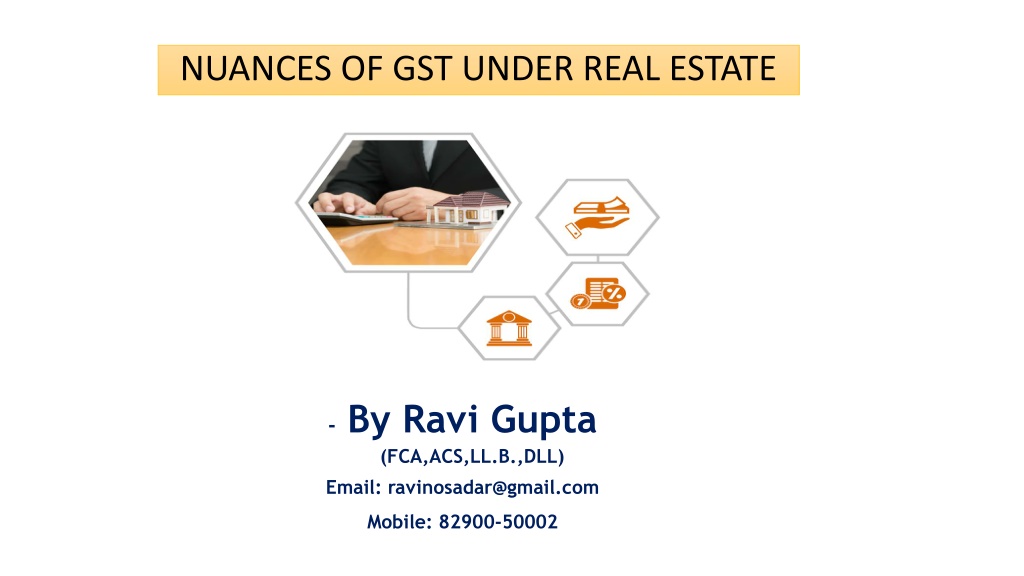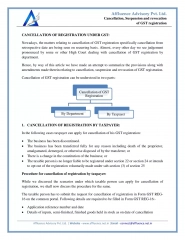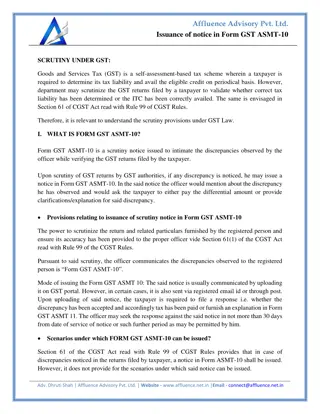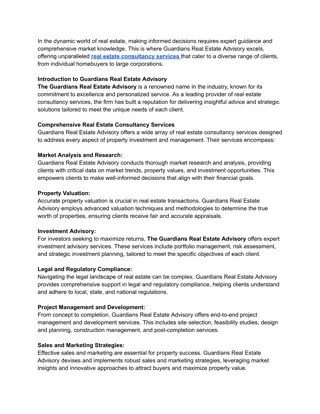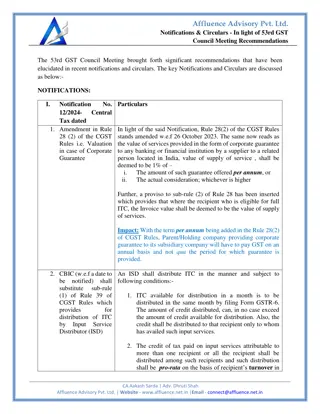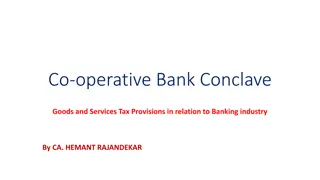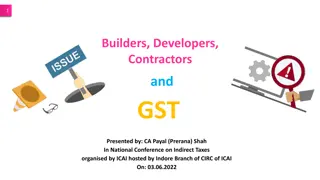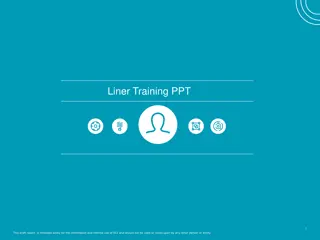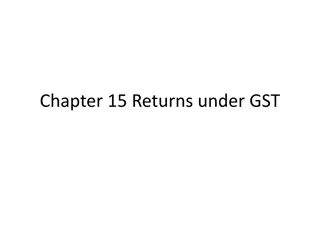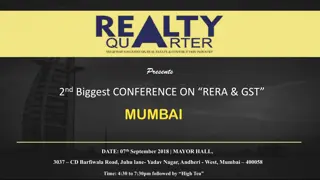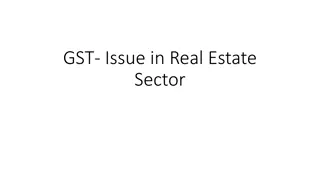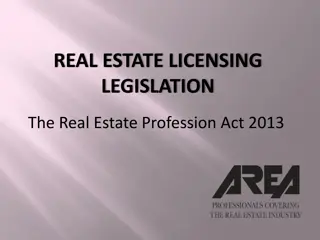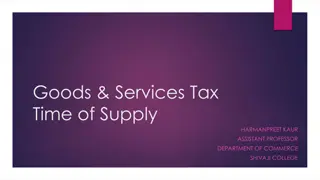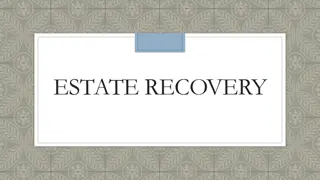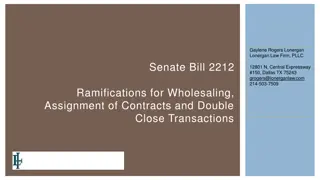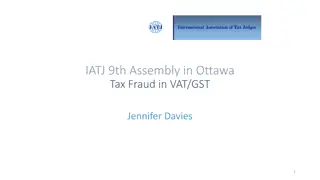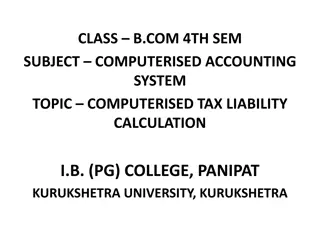Understanding GST Nuances in Real Estate
The realm of GST in real estate, particularly works contracts and property sales, is intricate and crucial to the country's GDP growth. This includes transactions like leases, constructions, and sales, all of which have specific provisions under the CGST Act. While some real estate transactions are subject to GST, others are exempt based on certain criteria outlined in the legislation.
Download Presentation

Please find below an Image/Link to download the presentation.
The content on the website is provided AS IS for your information and personal use only. It may not be sold, licensed, or shared on other websites without obtaining consent from the author. Download presentation by click this link. If you encounter any issues during the download, it is possible that the publisher has removed the file from their server.
E N D
Presentation Transcript
NUANCES OF GST UNDER REAL ESTATE - By Ravi Gupta (FCA,ACS,LL.B.,DLL) Email: ravinosadar@gmail.com Mobile: 82900-50002
OVERVIEW One of the most complex areas of the indirect tax levied by the Centre and the States is Works contract and sale of property. Construction and Real Estate sector constitutes approximately 10% of the country total GDP. Growth of this sector has a direct nexus with the nations growth.
"Works contract" means a contract for building, construction, fabrication, completion, erection, installation, fitting out, improvement, modification, repair, maintenance, renovation, alteration or commissioning of any immovable property wherein transfer of property in goods (whether as goods or in some other form) is involved in the execution of such contract- section 2(119) of CGST Act.
As per deeming provisions contained in Schedule II of CGST Act and SGST Act, GST can be levied on following transactions relating to real estate. Any lease, tenancy, easement, license to occupy land [The lease of tenancy of land can be of any period - even 99 or 999 years]. Any lease or letting out of the building including a commercial, industrial or residential complex for business or commerce, either wholly or partly [This covers renting or leasing of building. Even renting of part of residential complex for business or commerce will be subject to GST]. Renting of immovable property [Since lease of building and land is already covered in aforesaid clauses, this can cover other immovable property like plant and machinery]. Construction of a complex, building, civil structure or a part thereof, including a complex or building intended for sale to a buyer, wholly or partly, except where the entire consideration has been received after issuance of completion certificate, where required, by the competent authority or after its first occupation, whichever is earlier. [This covers sale of apartments before it is occupied.].
As per Schedule III of CGST Act read with section 7(2)(a) of CGST Act, following matters will not be treated as supply of goods or services Sale of land and, Sale of building [Para 5(b) of Schedule II covers sale of complex (now termed as 'apartment' after 1-4-2019), building or civil structure or a part thereof, before its completion] Thus, sale of apartment, building or civil structure or part thereof, after its completion or first occupation will not be subject to GST.
Meaning Of First Occupation 'Occupation' by whom? The 'occupation' should be of that particular apartment which is being sold or any apartment in that complex. First occupation' means 'first occupation' of the project in accordance with laws, rules and regulations of State/Central Government or any other authority. Thus, mere staying in the apartment before obtaining completion/occupancy certificate will not be considered as 'first occupation'.
The general rate of GST on construction and works contract service was 18% (9% CGST plus 9% SGST) or 18% IGST. However, in case of construction of complex, the builder charges a amount which is inclusive of land or undivided share of land. In that case, the land value will be taken as one third (33.33%) of total amount (i.e. value including land value) and GST is payable on balance amount. Thus, effectively GST rate was 12% (6% CGST plus 6% SGST) or 12% IGST, upto 31-3-2019:
No separate tax for supply of land or undivided share of land on lease as part of composite supply of flats When a builder sales flat to buyer, he also transfers to him undivided share of land by way of lease or sub-lease. In such cases, the value of service for GST is Nil, if the amount charged for such lease or sub-lease is one-third of total amount charged for composite supply or less than one-third of total amount charged.
There will be some unsold flats at the time of receipt of building completion certificate/occupancy certificate. GST will not apply when such ready possession flats are sold at a later date. The Input Tax Credit which was availed will have to be proportionately reversed. Formula for such reversal has been specified in rule 42 of CGST Rules. However, this rule is not at all suitable to calculate reversal. However, if you go strictly by that rule, reversal will apply as and when the flats are sold as the formula in rule 42 talks of 'tax period' which is a financial year. ITC, turnover and value of exempt supply has to be considered for 'tax period'. Thus, legally, it was not required to reverse ITC as soon as completion certificate was obtained. Now the provisions are completely changed w.e.f. 1-4-2019.
No refund of ITC even if input tax credit more than gst payable on outward supply in case of construction of complex In case of inverted duty rates (i.e. input tax credit more than tax payable on outward supply), there is provision of refund of excess credit under section 54(3) of CGST and SGST Act. However, in case of services of construction of complex, refund of unutilized ITC will not be available This provision is not relevant after 1-4-2019 where the promoter opts for payment of GST @ 1%/5%.
Major changes have been made w.e.f. 1-4-2019 in respect of GST on real estate projects, Transfer of development rights, sale of FSI and long-term lease of land for construction of apartments. CA YASHWANT
Radical Changes made w.e.f. 1-4-2019 ITC abolished for residential segment No option to pay GST at higher rate and claim ITC The revised scheme applies to residential and commercial apartments which are covered under RERA [Real Estate (Regulation and Development) Act, 2016]. The provisions do not apply to construction of single houses or works contracts not covered under RERA The new scheme is compulsory for projects commenced on or after 1-4-2019. In respect of ongoing projects as on 31-3-2019, the promoter has option to shift to new scheme w.e.f. 1-4-2019 (without ITC) or continue under earlier scheme (with ITC)
GST RATES The Effective GST rates for residential apartments are as follows (a) CGST 0.5% plus SGST/UTGST 0.5% (total 1%) or IGST 1% (without ITC) for affordable residential apartments (b) CGST 2.5% plus SGST/UTGST 2.5% (total 5%) or IGST 5% (without ITC) for other residential apartments. In respect of commercial apartments (shops, offices, godowns etc.) in RREP, the GST rate is CGST 2.5% plus SGST/UTGST 2.5% (total 5%) or IGST 5% (without ITC). In respect of construction of commercial apartments (other than RREP), the GST rate is CGST 6% plus SGST/UTGST 6% (total 12%) or IGST 12% (with ITC).
REP Real Estate projects. can cover both residential and commercial apartments (shops, offices, godowns) Commercial apartment means other than residential apartment RREP It means REP with commercial apartments not more than 15% of total carpet area balance residential apartments common buildings are not commercialapartments Affordable Residential Apartment means apartment having carpet area not exceeding 60 square meter in metropolitan cities or 90 square meter in cities or towns other than metropolitan cities and for which the gross amount charged is not more than Rs. 45 lakhs.
Metropolitan cities are Bengaluru, Chennai, Delhi NCR (limited to Delhi, Noida, Greater Noida, Ghaziabad, Gurgaon, Faridabad), Hyderabad, Kolkata and Mumbai with their geographical limits prescribed by the Government
In case of ongoing projects as on 1-4-2019, the promoter has option to opt for earlier provisions of tax i.e. with utilization of ITC. If promoter intends to continue under old scheme, he has to submit declaration in specified form to jurisdictional Commissioner before 20-5-2019. If the promoter does not submit such declaration, he is deemed to have opted for the new scheme. In case of ongoing projects, if the promoter intends to shift to new scheme (of 1%/5%) w.e.f. 1- 4-2019, he is required to refund excess ITC availed as on 31-3-2019 or get credit of ITC less claimed as on 31-3-2019. In respect of new projects, the tax (CGST, SGST/UTGST or IGST as applicable) shall be paid in cash by debiting the electronic cash ledger only [without utilising Input Tax Credit].
Promoter is required to procure all capital goods and at least 80% of inputs and input services from registered suppliers. If not so procured, tax is payable by promoter on the balance amount. All cement must be purchased from registered supplier only. If not so received, the promoter is required to pay GST @ 28% under reverse charge by promoter. After considering payment of GST on cement under reverse charge (if any), at least 80% of the procurement of inputs and input services [other than services by way of grant of development rights, long term lease of land (against upfront payment in the form of premium, salami, development charges etc.) or FSI (including additional FSI), electricity, high speed diesel, motor spirit, natural gas], used in supplying the real estate project service shall be received from registered supplier only.
If there is shortfall in procurement from registered suppliers, i.e. if still requirement of procurement of 80% from registered suppliers is not achieved, GST @18% is payable on value to the extent of shortfall. In case of capital goods procured from unregistered person, the promoter is liable to pay GST under reverse charge. Inputs and input services on which tax is paid on reverse charge basis shall be deemed to have been purchased from registered person.
The contractor or sub-contractor supplying service to promoter or other contractor is liable to pay tax @18% in case of construction of commercial apartments or residential apartments other than affordable apartments. In case of services of contractor or sub-contractor for construction of affordable apartments, the GST rate is 12% (The carpet area of affordable residential apartments should be at least 50% of total carpet area of all the apartments in the project) Input Tax Credit is available.
For the purpose of determining whether the apartments at the time of supply of the service are affordable residential apartments, value of the apartments shall be the value of similar apartments booked nearest to the date of signing of the contract for supply of the service. In case it finally turns out that the carpet area of affordable residential apartments was less than 50% of total carpet area of all the apartments, the promoter shall be liable to pay difference between normal tax payable and the tax collected at concessional rate from the buyers, under reverse charge basis. The contractor can rely on declaration by promoter that the project meets conditions of concessional rate on the works contract service.
ITC REVERSAL RULE AMENDED FOR REAL ESTATE SECTOR
Where promoter opts to pay tax at full rate (8%/12%) after availing ITC, proportionate reversal of Input Tax Credit is required in respect of apartments remaining unsold as on date of completion or first occupation, whichever is earlier. The reversal is required to be made on date of completion of project. Reversal should be as per rule 42 of CGST Rules in respect of inputs and input services and rule 43 of CGST Rules in respect of capital goods. Such reversal will be on basis of carpet area and not on basis of value.
Purchaser of apartment may sale before completion certificate He is not liable to pay GST as he is not supplier of construction service and he is not in business of sale of apartment (though even casual transaction can be taxed) dispute possible. Promoter can adjust GST only if he refunds the amount with GST. If customer cancels booking, the promoter deducts certain amount. On that amount, GST @ 18% applies as it is tolerating an act or situation deemed service
Prime Location Charges, External Development Charges (EDC), parking space charges etc. These are naturally bundled services and should form part of totalamount charged for purpose of GST. Club Membership deposit or fee is not naturally bundled service and should be taxable at hands of club. Maintenance service provided by promoter till housing society or Resident Welfare Association (RWA) is constituted GST @ 18% - exemption of Rs 7,500 per month not available.
JOINT DEVELOPMENT PROJECTS The Landowners may not be having the resources or technical expertise to do the infrastructure development works. Such landowners approach the developer or vice versa. The developer develops the infrastructure for the project, using his money, technical and financial resources. In respect of joint development projects, the developer would get the irrevocable right to enter and engage in the development of land from the landowner, through Joint Development Agreement, commonly Known as JDA, for the purpose of plan sanction and infrastructural development. After sanction from the local authority, the land is converted into sites.
Often promoter enters into agreement with land owner in respect of Real Estate Project. Land owner transfers development rights to promoter. In some cases, land owner has revenue sharing arrangement with promoter. In that case, promoter is liable to pay GST on entire supplies of apartment. In some cases, land owner-promoter is allotted some apartments ie. area sharing arrangement, which he sales on his own account either before completion or after completion.
Revenue sharing Arrangement- As per the agreement entered by landowner and developer, it maybe decided that 100% consideration received from the customer would be retained by the developer and he would pay taxes, including GST as applicable. In such a scenario, the landowner could be paid a revenue share arising out of the consideration received by the developer. Area Sharing Arrangement- In area sharing agreement, the landowner and the developer enter into an agreement where the development rights to construct or develop a complex is bestowed on the developer by the landowner. In return to that, the landowner is assigned a portion of the constructed area in the form of flats by the developer as consideration. In this scenario, the consideration flows from both ends.
GST on Joint Development Agreement For Transfer of Development Rights by Landowner:- 1) For Residential Projects:- Before March 2019: If the parties entered the JDA before March 31, 2019, the landowner needs to pay 18% GST. After March 2019: However, if the parties entered the JDA on or after April 1, 2019, the GST should be discharged by the developer under the reverse charge mechanism. In this case, a GST of 1% is levied for affordable housing and 5% for non-affordable. 2) For Commercial Projects:- Before or after March 2019: For the transfer of development rights by the landowner, the landowner needs to pay 18% GST.
As per Sr. No. 5 of Schedule III of the CGST Act, 2017, sale of land is kept outside the purview of GST. In case of plotted development, the land is sold by the developer to plot owner and activities like levelling, laying drainage lines, electricity lines etc. is carried out. As per Circular No. 177/09/2022 TRU dated 03-08-2022 (para 14), land sold after some development, like levelling, laying down of sewage lines etc., is also covered within Sr. No.5 of Schedule III and hence no GST is payable.
Ravi Gupta & Associates Counsel & Consultants S-11,Alankar Plaza, Central Spine, Vidhyadhar Nagar, Jaipur. Email: ravinosadar@gmail.com Mobile: 82900-50002
